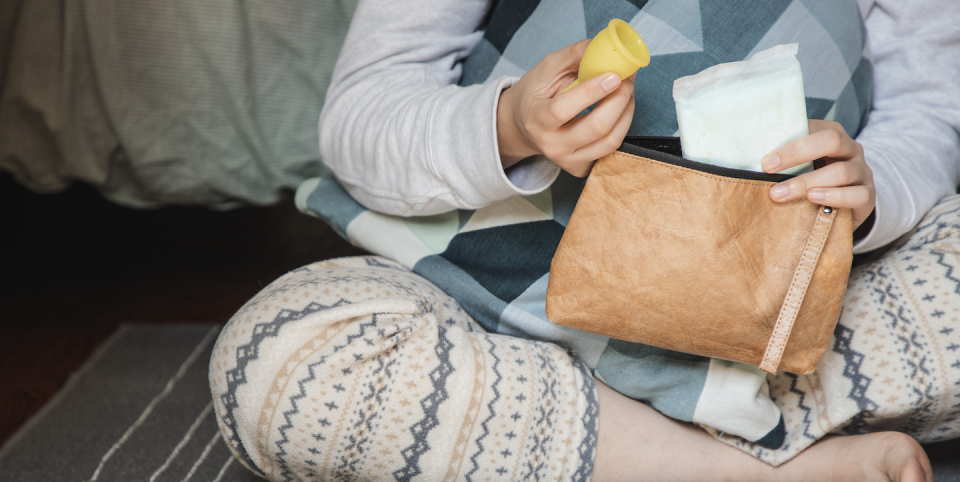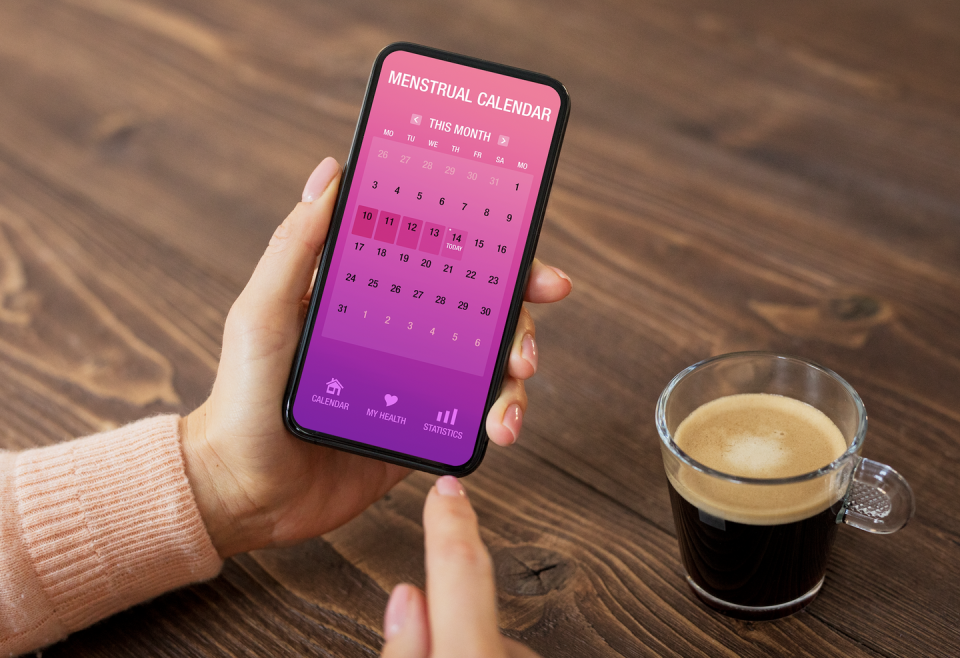Ever had two periods in one month? We spoke to doctors to find out why...

If you've ever had that time of the month call, err, twice in one go, then you might be wondering whether it's normal. Well, given that thousands of us head to Google each month to ask that very question, it seems that those of us who've had two periods in one month aren't alone. So, what's the cause? How common is it? And – more importantly – should we be worried?
While it's always best to seek medical advice from your GP or a specialist, we asked Dr Sarah Jarvis, also an advocate for leading femtech device, Livia, to explain some of the more common causes of having two bleeds in a month (in the hopes that it will be reassuring while you wait for an appointment).
We also got some advice from Dr Tiffany Pham (DO), board-certified OB-GYN and medical advisor atFlo Health, on what to do should a second period of the month arise.
Firstly, Dr Jarvis says it's important to confirm that you're definitely having two distinct periods, rather than experiencing spotting between periods (spotting is much lighter than a period and shouldn't involve enough blood to warrant using a tampon or having to frequently change sanitary pads).
"Spotting, or any type of bleeding, between your periods should always be checked out as it could indicate a sexually transmitted disease, or in very rare cases, cancer of the womb or cervix," says Dr Jarvis. "However, there are a couple of instances where you might want to hold off before calling the doctor, such as if you’ve recently started a new method of hormonal contraception, like the oral contraceptive pill, implant, patch or hormone-releasing coil, and your GP or sexual health advisor has told you to expect irregular bleeding for a while."

Is it normal to have two periods in one month?
If spotting's not the case – and you’re sure you've definitely had two defined periods – there are several possible causes. But for the most part, it's not that unusual to bleed twice over the space of a month.
"This is possible," explains Dr Pham. "Certain medical conditions or stressors on the body can cause changes to your menstrual cycle which may lead you to experience more frequent or less frequent periods.
Dr Jarvis adds that some people naturally have cycles that are shorter than the usual monthly expectation. "Firstly, most women assume that the only 'normal' duration between periods is 28 days, when in fact, anything from about 21 to 40 days is considered normal." She adds that some women who previously had longer (28 days or more) cycles may experience two periods in a month if their cycle gets shorter.
If you're taking the combined contraceptive pill and miss a couple of doses, you may also get a withdrawal bleed which seems like an extra period. "You can also get a period-type bleed after taking the emergency contraceptive pill too," Dr Jarvis notes, adding that some forms of hormonal contraception, especially the contraceptive implant, can also lead to more frequent periods, as well as the earlier-mentioned spotting.
As for whether or not you need to urgently contact a doctor, if you’ve only recently changed the type of contraception you use, or are taking a form of contraception that can cause irregular periods (e.g. most forms of hormonal contraception, apart from the combined oral contraceptive pill), Dr Jarvis says it’s generally pretty safe to just monitor your periods for a while. However, if you're getting other symptoms too, or find yourself feeling anxious, then there's certainly no harm in booking in for a chat.
"The same [advice] applies to a 'one-off' extra period with no other symptoms," she continues. "If you're experiencing any pain, painkillers can be effective or, for an drug-free alternative, the Livia device uses targeted micro-pulses to help block pain signals and may work quicker than medication."
Age can also be a factor when looking at why you may experience two periods in a month, Dr Jarvis explains. "As you move towards the menopause you stop ovulating as regularly and your cycle can become longer, shorter or more erratic." Other possible causes include an under or overactive thyroid, losing or gaining a lot of weight quickly, or going through major illness or stress. "Having fibroids or ovarian cysts may also increase the likelihood of having more frequent periods," she says.
Can stress cause you to have two periods in one month?
Potentially, yes. "Extreme stress can play havoc with the delicate hormone balance needed for ovulation and periods to happen regularly," says Dr Jarvis. "If you’ve gone through major trauma or stress of late, or have made big changes to your lifestyle (e.g. suddenly increasing your exercise, or losing or gaining a lot of weight), you may find your period pattern changes."
"There is a delicate balance between the communication of your brain, particularly the pituitary gland, and your ovaries which subsequently results in ovulation and your menstrual period," agrees Dr Pham. "Stress can cause a disruption in this communication pattern by decreasing the chemical signals that are sent out by your pituitary gland to the ovaries.
"These chemical signals (LH and FSH) act on the ovaries to stimulate ovulation. When stress causes disruption of these chemical signals, ovulation is impaired which can subsequently result in irregularities of your menstrual cycle pattern."
How can diet lead to two periods a month? What causes the change?
Dr Pham says the link between diet and our menstrual cycle is nuanced.
"The body of research suggests that diets containing high amounts of processed foods, high glycemic index carbohydrates, trans or saturated fatty acids should be limited." she explains. "The regulation of your menstrual cycle also requires adequate amounts of nutrients and energy in order to take place, thus if your diet results in nutritional deficiencies or excessive amounts of weight loss, this can also play a role in menstrual irregularities."
What else could cause two periods a month? Why?
"There are a variety of medical conditions that can cause your menstrual cycle to be irregular such as PCOS, thyroid disorders, or high levels of a hormone called prolactin to name a few," Dr Pham explains. "Conditions such as uterine fibroids or polyps or pelvic infections can also cause you to bleed excessively.
"Certain medications or bleeding disorders may also contribute to a heavy bleeding pattern. While this is not an exhaustive list, if you have concerns about your bleeding pattern, it is always advisable to consult your doctor."
When should we consult a GP about our periods?
Dr Pham explains that any change to your period that occurs persistently or deviates from the normal pattern should be reported to your GP.
"If you consistently skip your period, or if it comes too early or too late for more than 1-2 cycles, this is also cause for investigation," she says. "A normal menstrual cycle is approximately 21-35 days in length, therefore if your period comes more frequently than 21 days apart, or often extends past the 35 day mark, this is considered irregular."
If you experience spotting or light bleeds in between your periods, this should also be reported to your GP, Dr Pham adds.

"If your periods are prolonged, you bleed for more than 7-10 days regularly, you will want to be evaluated by your GP," she says. "If your bleeding pattern is quite heavy where you are consistently passing blood clots or bleeding through pads,tampons, or menstrual cups or if you have to change your pads or tampons quite often (every 1-2 hours or so), this may be abnormal.
"If your period causes severe pelvic pain that is unrelieved with medications or if the pain causes nausea/vomiting or prevents you from doing daily activities and tasks, this should also be reported to your GP."
As for other considerations, Dr Jarvis adds that it's important to remember that spotting can happen in pregnancy (and you should always alert your doctor if this happens, or call 111). "Miscarriage can result in bleeding which may be mistaken for an extra period too," she says. "You should always speak to a doctor if you have spotting or irregular bleeding between periods, pain or bleeding when you make love (or immediately afterwards), vaginal discharge (especially if it smells offensive), persistent or severe low tummy pain, or a significant change to your menstrual pattern, including increased cramps, dark clots or flooding."
The bottom line? It's probably hormone-related but if something doesn't feel right or it's causing you anxiety, it's always worth getting it checked out.
This article is not intended to be a substitute for professional medical advice or diagnosis. Always seek the advice of your physician or other qualified health provider with any questions you may have regarding a medical condition.
You Might Also Like

 Yahoo Finance
Yahoo Finance 